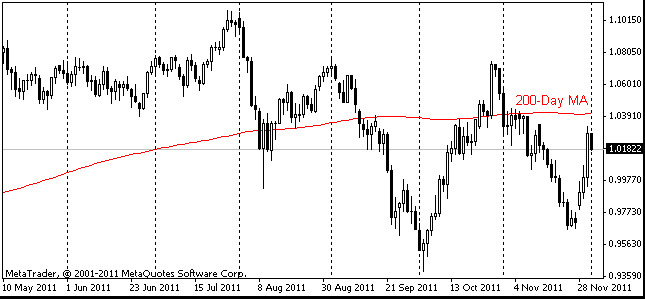EUR/usd
Americans are fleeing from Hurricane Sandy, which may prove to be the biggest on record and even reach New-York and Washington. Yet its scale is expected to be much less than that of infamous Katrina. Anyway, it's been decided to cancel trades at NYSE on Monday and probably the same order will extend to Tuesday. As a result, trading activity will be very low today, especially in the afternoon. On Friday there was a release of the US GDP data, which showed that the country's economy managed to demonstrate a better performance than expected. The annualized growth rate made 2.0% q/q. And in comparison with the third quarter of the previous year the growth amounted to 2.3%. So, the Fed acted much in advance, “foreseeing” the further slowdown of activity, which may or may not happen only in the current quarter or in the first quarter of the coming year. Such favourable data are not very surprising, as back at the end of summer we already stated that it would be too early to extend QE in September. This idea found evidence in Friday's GDP report. The data on the revised consumer sentiment from UoM also proved the idea. Despite a slight decline against the preliminary estimate, the index is at its highest level over the last five years, that is 82.6. Yet the inflation expectations remain relatively restrained, at 3.1%. This Friday we will learn whether pessimism around the USA has grounds or is build up before the elections. The Economist magazine has recently studied the consumer sentiment right after the elections and by the time when the president takes the office. Obama is second best on record. We don't have researches for all these years, but one can say with certainty that Obama would win the election if we compared the consumer sentiment index now and four years ago with the impressive growth by 25 pips. Well, will it help Obama to win? There are too many unrealized hopes.

GBP/USD
The most unvolatile index of housing prices in Britain – by Hometrack – demonstrated this night that over the last four months the housing prices have been declining by 0.1% monthly. Still it's not utterly bad, especially in comparison with the same month a year ago – now the index shows a decline just by 0.4%. At first sight, such a progress sounds ironical, however a year ago the same index demonstrated a drop by 2.8% and in July 2011 the drop made 3.9%. The stability of this index at the time of inflation and wage increase will help to reduce the cost of houses, gently blowing off the housing bubble.

USD/JPY
Tomorrow is an important day for the yen. At night another decision on the monetary policy from the BOJ will be announced. All through the last week it was rumoured that the Bank would decide in favour of the QE extension to stimulate the economic growth. This step would be quite logical if the BOJ had the same way of thinking as the Fed. But it's been too often the case that the Japanese preferred to wait till the situation improved on its own. We think that the BOJ will extend the programme by ¥10trln, which is equal to $12.5bln. This is very little. It's very likely that in this case usdjpy will continue a downward retracement, started on Friday.

AUD/USD
The aussie assumed a wait-and-see policy. On the one hand, we have Friday's data on the US GDP and increased confidence in the stabilization of the global growth rate. And on the other hand, the commodity prices remain low and the country's CB is still very bellicose in regard to the strength of its domestic currency. The economists forecast the interest rate cut in November, despite a noticeably accelerated inflation pace.
